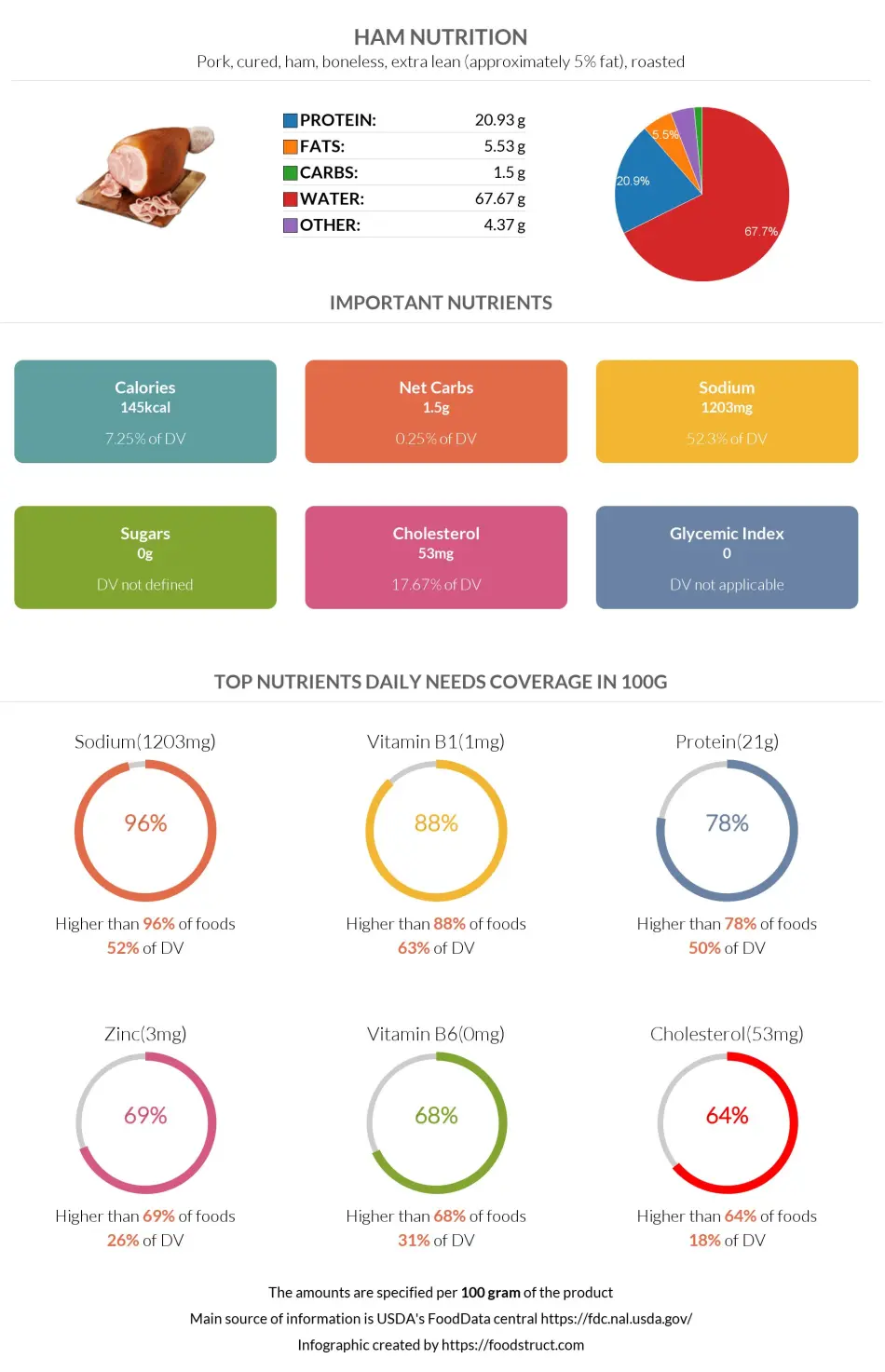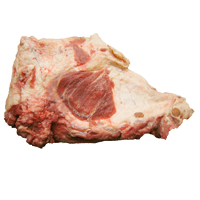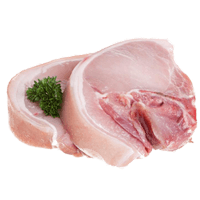Ham nutrition: calories, carbs, GI, protein, fiber, fats
Pork, cured, ham, boneless, extra lean (approximately 5% fat), roasted
Top nutrition facts for Ham

| Glycemic index ⓘ Ham can be considered as a 0 glycemic index food as it does not have carbs. Source: https://foodstruct.com/articles/glycemic-index-of-0-no-carb-foods | 0 (low) |
| Insulin index ⓘ https://ses.library.usyd.edu.au/handle/2123/11945 – II for shaved ham is 19 | 19 |
| Calories ⓘ Calories for selected serving | 203 kcal |
| Net Carbs ⓘ Net Carbs = Total Carbohydrates – Fiber – Sugar Alcohols | 2 grams |
| Default serving size ⓘ Serving sizes are mostly taken from FDA's Reference Amounts Customarily Consumed (RACCs) | 3 oz (85 grams) |
| Acidity (Based on PRAL) ⓘ PRAL (Potential renal acid load) is calculated using a formula. On the PRAL scale the higher the positive value, the more is the acidifying effect on the body. The lower the negative value, the higher the alkalinity of the food. 0 is neutral. | 11 (acidic) |
| Oxalates ⓘ https://www.hsph.harvard.edu/nutrition-questionnaire-service-center/nutrient-tables-download-page/ | 1 mg |
Sodium ⓘHigher in Sodium content than 96% of foods
Vitamin B1 ⓘHigher in Vitamin B1 content than 88% of foods
Protein ⓘHigher in Protein content than 78% of foods
Zinc ⓘHigher in Zinc content than 69% of foods
Vitamin B6 ⓘHigher in Vitamin B6 content than 68% of foods
Ham calories (kcal)
| Serving Size | Calories | Weight |
|---|---|---|
| Calories in 100 grams | 145 | |
| Calories in 1 cup | 203 | 140 g |
| Calories in 3 oz | 123 | 85 g |
Ham Glycemic index (GI)
Ham can be considered as a 0 glycemic index food as it does not have carbs. Source: https://foodstruct.com/articles/glycemic-index-of-0-no-carb-foods
Mineral coverage chart
Mineral chart - relative view
Vitamin coverage chart
Vitamin A:
0µg of 900µg
0%
Vitamin E:
1.1mg of 15mg
7%
Vitamin D:
3.4µg of 20µg
17%
Vitamin C:
0mg of 90mg
0%
Vitamin B1:
3.2mg of 1mg
264%
Vitamin B2:
0.85mg of 1mg
65%
Vitamin B3:
17mg of 16mg
106%
Vitamin B5:
1.7mg of 5mg
34%
Vitamin B6:
1.7mg of 1mg
129%
Folate:
13µg of 400µg
3.2%
Vitamin B12:
2.7µg of 2µg
114%
Choline:
357mg of 550mg
65%
Vitamin K:
0µg of 120µg
0%
Vitamin chart - relative view
Macronutrients chart
Protein:
Daily Value: 59%
29.3 g of 50 g
29.3 g (59% of DV )
Fats:
Daily Value: 12%
7.7 g of 65 g
7.7 g (12% of DV )
Carbs:
Daily Value: 1%
2.1 g of 300 g
2.1 g (1% of DV )
Water:
Daily Value: 5%
94.7 g of 2,000 g
94.7 g (5% of DV )
Other:
6.1 g
6.1 g
Protein quality breakdown
Tryptophan:
1054mg of 280mg
377%
Threonine:
3910mg of 1,050mg
372%
Isoleucine:
3856mg of 1,400mg
275%
Leucine:
6976mg of 2,730mg
256%
Lysine:
7455mg of 2,100mg
355%
Methionine:
2323mg of 1,050mg
221%
Phenylalanine:
3797mg of 1,750mg
217%
Valine:
3814mg of 1,820mg
210%
Histidine:
3150mg of 700mg
450%
Fat type information
Saturated fat:
2.5 g
Monounsaturated fat:
3.7 g
Polyunsaturated fat:
0.76 g
All nutrients for Ham per selected serving size (1 cup - 140g)
| Nutrient | Value | DV% | In TOP % of foods | Comparison |
| Vitamin A | 0µg | 0% | 100% | |
| Calories | 203kcal | 10% | 61% |
3.1 times more than Orange
|
| Protein | 29g | 70% | 22% |
7.4 times more than Broccoli
|
| Fats | 7.7g | 12% | 48% |
6 times less than Cheese
|
| Vitamin C | 0mg | 0% | 100% |
N/A
|
| Net carbs | 2.1g | N/A | 68% |
36.1 times less than Chocolate
|
| Carbs | 2.1g | 1% | 69% |
18.8 times less than Rice
|
| Cholesterol | 74mg | 25% | 36% |
7 times less than Egg
|
| Vitamin D | 1.1µg | 11% | 46% |
2.8 times less than Egg
|
| Magnesium | 20mg | 5% | 75% |
10 times less than Almonds
|
| Calcium | 11mg | 1% | 82% |
15.6 times less than Milk
|
| Potassium | 402mg | 12% | 40% |
2 times more than Cucumber
|
| Iron | 2.1mg | 26% | 49% |
1.8 times less than Beef broiled
|
| Sugar | 0g | N/A | 100% |
N/A
|
| Fiber | 0g | 0% | 100% |
N/A
|
| Copper | 0.11mg | 12% | 64% |
1.8 times less than Shiitake
|
| Zinc | 4mg | 37% | 31% |
2.2 times less than Beef broiled
|
| Phosphorus | 274mg | 39% | 39% |
1.1 times more than Chicken meat
|
| Sodium | 1684mg | 73% | 4% |
2.5 times more than White bread
|
| Vitamin E | 0.35mg | 2% | 71% |
5.8 times less than Kiwi
|
| Manganese | 0.08mg | 3% | 66% | |
| Selenium | 27µg | 50% | 47% | |
| Vitamin B1 | 1.1mg | 88% | 12% |
2.8 times more than Pea raw
|
| Vitamin B2 | 0.28mg | 22% | 44% |
1.6 times more than Avocado
|
| Vitamin B3 | 5.6mg | 35% | 41% |
2.4 times less than Turkey meat
|
| Vitamin B5 | 0.56mg | 11% | 65% |
2.8 times less than Sunflower seeds
|
| Vitamin B6 | 0.56mg | 43% | 32% |
3.4 times more than Oats
|
| Vitamin B12 | 0.91µg | 38% | 45% |
1.1 times less than Pork
|
| Vitamin K | 0µg | 0% | 100% |
N/A
|
| Folate | 4.2µg | 1% | 87% |
20.3 times less than Brussels sprouts
|
| Choline | 119mg | 22% | 55% | |
| Saturated fat | 2.5g | 13% | 49% |
3.3 times less than Beef broiled
|
| Monounsaturated fat | 3.7g | N/A | 47% |
3.7 times less than Avocado
|
| Polyunsaturated fat | 0.76g | N/A | 60% |
87.4 times less than Walnut
|
| Tryptophan | 0.35mg | 0% | 57% |
1.2 times less than Chicken meat
|
| Threonine | 1.3mg | 0% | 59% |
1.3 times more than Beef broiled
|
| Isoleucine | 1.3mg | 0% | 62% |
Equal to Salmon raw
|
| Leucine | 2.3mg | 0% | 61% |
1.5 times less than Tuna Bluefin
|
| Lysine | 2.5mg | 0% | 61% |
3.9 times more than Tofu
|
| Methionine | 0.77mg | 0% | 61% |
5.8 times more than Quinoa
|
| Phenylalanine | 1.3mg | 0% | 58% |
1.4 times more than Egg
|
| Valine | 1.3mg | 0% | 67% |
2.2 times less than Soybean raw
|
| Histidine | 1.1mg | 0% | 56% |
Equal to Turkey meat
|
| Caffeine | 0mg | 0% | 100% | |
| Omega-3 - EPA | 0g | N/A | 100% |
N/A
|
| Omega-3 - DHA | 0g | N/A | 100% |
N/A
|
| Omega-3 - DPA | 0g | N/A | 100% |
N/A
|
Check out similar food or compare with current
NUTRITION FACTS LABEL
Nutrition Facts
___servings per container
Serving Size ______________
Serving Size ______________
Amount Per 100g
Calories 203
% Daily Value*
12%
Total Fat
7.7g
12%
Saturated Fat 2.5g
0
Trans Fat
0g
25%
Cholesterol 74mg
73%
Sodium 1684mg
0.7%
Total Carbohydrate
2.1g
0
Dietary Fiber
0g
Total Sugars 0g
Includes ? g Added Sugars
Protein
29g
Vitamin D
45mcg
5.6%
Calcium
11mg
1.1%
Iron
2.1mg
26%
Potassium
402mg
12%
*
The % Daily Value (DV) tells you how much a nutrient in a serving of food contributes to a daily diet. 2,000 calories a day is used for general nutrition advice.
Health checks
ⓘ
Dietary cholesterol is not associated with an increased risk of coronary heart disease in healthy individuals. However, dietary cholesterol is common in foods that are high in harmful saturated fats.
Source
Low in Cholesterol
ⓘ
Trans fat consumption increases the risk of cardiovascular disease and mortality by negatively affecting blood lipid levels.
Source
No Trans Fats
ⓘ
Saturated fat intake can raise total cholesterol and LDL (low-density lipoprotein) levels, leading to an increased risk of atherosclerosis. Dietary guidelines recommend limiting saturated fats to under 10% of calories a day.
Source
Low in Saturated Fats
ⓘ
While the consumption of moderate amounts of added sugars is not detrimental to health, an excessive intake can increase the risk of obesity, and therefore, diabetes.
Source
Low in Sugars
Ham nutrition infographic

Infographic link
References
All the values for which the sources are not specified explicitly are taken from FDA’s Food Central. The exact link to the food presented on this page can be found below.


